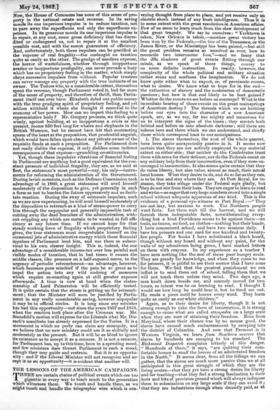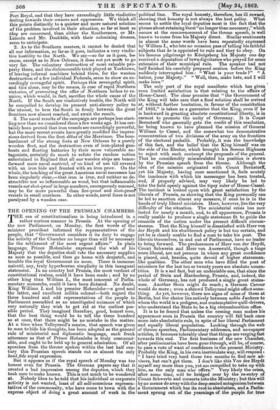THE LESSONS OF THE AMERICAN CAMPAIGNS.
THERE are certain chains of political events which are too gigantic in every way to teach much to the generation which witnesses them. We touch and handle them, as we might touch and handle the telegraphic wire which is con- veying thought from place to place, and yet receive only an electric shock instead of any fresh intelligence. Thus it is to some extent with the great revolution in American affairs. Few of us seem to learn much from the slow development of that great tragedy. We say to ourselves : a Yorktown is taken, New Orleans is taken,—another great victory has been won by the Federals,—the line of the Tennessee, or the James River, or the Mississippi has been gained,—but still the great problem remains as unsolved as ever, how to reconcile two internecine foes,"—and we fancy that the dtfn shadows of great events flitting through our minds, as we speak of these things, convey to us some definite instruction. In reality, however, the complexity of the whole political and military situation rather stuns and confuses the imagination. We do not know quite either what to expect, or, of proximate events, what to desire. We know what to hope for in the end— the extinction of slavery and the moderation of democratic passions ; but how is that end likely to be best gained ? Whither do the eventswe see before us converge? What is the immediate bearing of' those events on the great mainsprings of American destiny ? The threads which we see knitting before our eyes into the character of a new American epoch, are, as we say, far too mighty and numerous for us to interpret the signs of the times ; they stretch both behind and before us into absolute darkness ; still there are tokens here and there which we can understand, and chiefly those which correspond least to our anticipations.
1. The slaves themselves, the root of the whole quarrel, have been quite unexpectedly passive in it. It seems now certain that they are not actively employed to any material extent on either side ; that neither do the Confedrates trust them with arms for their defence, nor do the Federals count on any military help from their insurrection, even if they were en- couraged to insurrection. It also seems quite certain that they do value liberty, but also value, almost as much, their actual local homes. What they desire to do, and do so far as they can, is to be free and stay where they are. At Port Royal, for in- stance, they take refuge under the Federal aegis gladly, but they de not stir from their huts. They are eager to learn to read and write—so eager that very large numbers crowd into a single school without adequate apparatus of any kind. This is the evidence of a personal eye-witness at Port Royal :—" They are not lazy, but anxious to work. The Northern people want facts. Let them wait till the harvest, and we will furnish them indisputable facts, notwithstanding every- thing but a kind Providence seems to be against them—no tools, no teams, no food, no clothes—nothing but their hands. I have commenced school, and have two sessions daily. I have ten primers and one card for one hundred and twenty- five people. For books I have substituted a black board, though without any board and without any paint, for the walls of my schoolroom being green, I have marked letters on them with crayons. In my experience as a teacher I have seen nothing like the zeal of these poor hungry souls. They are greedy for knowledge, and when they come to me for primers, it is pitiful to see their sorrow that I have none for them. We find that the greatest punishment we can inflict is to send them out of school, telling them that we will not teach them unless they mind. Two days ago, a man knelt down beside me, and scarcely moved for two hours, so intent was he on learning to read. I thought I would see how long he could bear it, but he tired me out.. He reads a piece until he knows every word. They learn quite as easily as our white children." Again, as to their desire for liberty, though it is not strong enough to take the form of insurrection, it is strong enough to cause what are called stampedes on a large scale when they are sure of attaining their freedom. Even from Maryland, where their chance was by no means good, the slaves have caused much embarrassment by escaping into the district of Columbia. And now that Fremont is in Western Virginia, we learn from Southern sources that slaves by hundreds are escaping to his standard. The .Richmond Dispatch complains bitterlyof this . danger. " Hundreds of them," it says, "are quitting their com- fortable homes to snuff the breeze of an adulterated freedom in the North." It seems clear, from all the tidings we can gather, that the slaves are much more passive than we at all anticipated in this great struggle of which they are the living centre—that they yet have a strong desire for liberty and for teaching—that they feel a strong 'fascination to their huts and bits of provision ground which will always indispose i them to colonization on any large scale if they can avoid it; that they are industrious enough when decently paid, as at Port Royal, and that they have exceedingly little vindictive feeling towards their owners and oppressors. We think all this points distinctly to a quieter and more natural solution of the problem involved in their situation, so far at least as they are concerned, than either the Southerners, or Mr. Lincoln and Mr. Doolittle, with their colonizing dreams, seem to anticipate. 2. As to the Southern masters, it cannot be denied that all our information, so far as it goes, indicates a very vindic- tive hostility to the North. We say—so far as it goes, beo. cause, except as to New Orleans, it does not yet sear to go very far. The voluntary destruction of most valuable pro- perty there, and the dishonourable trick played at Yorktown, of leaving infernal machines behind them, for the wanton destruction of a few individual Federals, seem to show an ex- ceedingly revengeful spirit. Perhaps this revengeful spirit, and this alone, may be the means, in case of rapid Northern victories, of preventing the offer of Northern bribes to re- union, which would, in fact, sacrifice the whole cause of the North. If the South are vindictively hostile, the North will be compelled to develop its present anti-slavery policy to the utmost, to hem the South in firmly between the great frontiers now almost reached, and await the result. 3. The naval results of the campaign are perhaps less start- ling now than we considered them a few weeks ago. It has cer- tainly been proved that iron vessels are exceedingly powerful, but the more recent events have greatly modified the impres- sions derived from the first abut of the Merrimac. The bom- bardment of the strong forts at New Orleans by a purely wooden fleet, and the destruction even of iron-plated gun- boats and floating batteries by their more vulnerable an- tagonists, certainly do much to refute the random notion entertained in England that all our wooden ships are hence- forward mere naval materiel, of no kind of use till covered with an iron hide and fronted with an iron prow. On the whole, the teaching of the great American naval successes has been singularly clear,—that iron is iron, and neither so de- structible nor so inflammable as wood, but that inflammable vessels not shot-proof in large numbers, courageously manned, may be far more powerful than fire-proof and shot-proof vessels in small numbers. In other words, naval force is not paralyzed by a wooden case.































 Previous page
Previous page